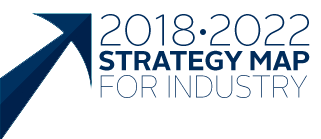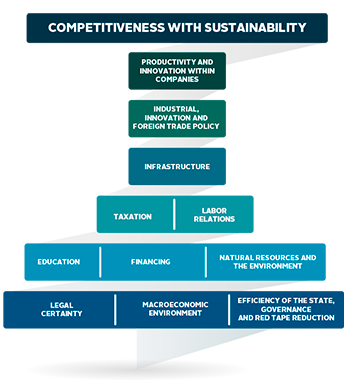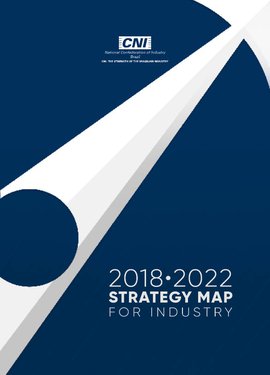Natural Resources and The Enviroment
Why Natural Resources and the Environment?
The lower availability of natural resources and consequent increase in their costs have made it imperative to strive for efficiency as a priority. Added to this is an increasing concern about the impacts of economic activities on the environment and on climate change. Consumers are increasingly demanding products and production processes with a lower impact on the environment and this issue has been drawing increasing attention from international organizations, governments, companies and society at large.
Brands and corporate image are increasingly linked to the posture of companies on environmental issues and this fact has increased the importance of promoting efficiency gains in natural resource use and of reducing greenhouse gas emissions.
The low-carbon economy and the circular economy, with the new technologies and management models associated with them, feature high on the competitiveness agenda. Companies that best seize these opportunities will have more competitive advantages.
VISION FOR 2022
Brazilian industry becomes a benchmark in the efficient use of natural resources and takes advantage of opportunities associated with the low-carbon economy and with the use of biodiversity assets. Weaknesses in sanitation are substantially reduced and the quality of services is improved. Red tape is eliminated from environmental licensing procedures, thus contributing to promoting investment and ensuring environmental quality.
How are we doing?
Brazil is relatively well-positioned in the Environmental Performance Index 2016: it was ranked 46th. However, the country is not doing so well in the area of Climate and Energy, which is related to trends in CO emissions, where it was ranked 92nd among 180 countries.
ENVIRONMENTAL PERFORMANCE RANKING

Where do we want to get to?
Main goal: Increasing industry’s efficiency in using natural resources
Macro objective: Improving industry’s productivity in using energy by 10% (from 91.1 to 100.2)
INDUSTRY’S PRODUCTIVITY IN USING ENERGY
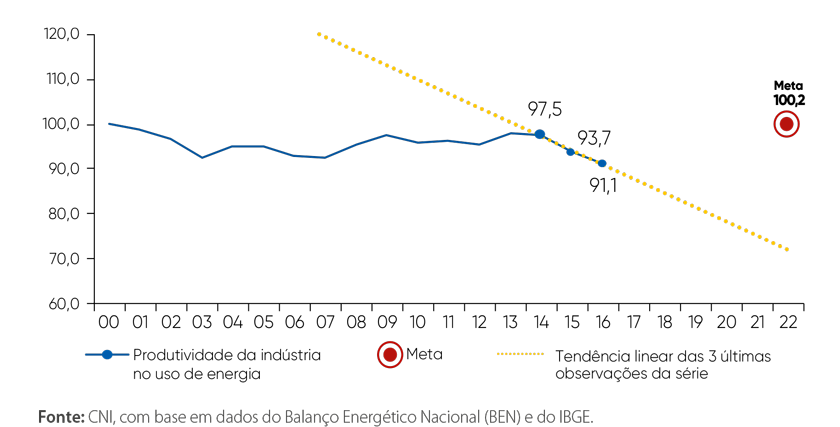
PRIORITY TOPICS
USE OF NATURAL RESOURCES
Industry can play an active role in promoting efficient and sustainable use of natural resources and in utilizing Brazilian biodiversity
The world is headed toward a new pattern of production and consumption that will require smarter use of natural resources. Competitiveness gains can be achieved by making efficient use of resources.
The practices proposed by the circular economy involve the optimization of production chains through recycling, remanufacturing, reuse, sharing, maintenance and product redesign. And they offer opportunities for developing new business models designed to reduce risks and boost competitiveness.
Brazil has made progress in reusing waste in several industrial sectors, but there is still much more room to grow for the country to become a benchmark in the circular economy.
The water crises in Brazil’s northeast, southeast and Midwest regions warn us of the need to promote more appropriate corporate strategies for water management. Companies are increasingly engaged in adopting water management practices and tools in their production processes and in seeking structural solutions jointly with other stakeholders.
Greater efficiency in the management of both water resources and solid waste implies efficient regulation designed to steer companies in the right direction without creating unnecessary costs.
Brazil is the country with the greatest biodiversity in the world and this fact should be seen as an economic asset affording many business opportunities. However, for this comparative advantage to be realized, investment, knowledge and a strategy are necessary. Industry has a key role to play in exploiting these opportunities and it is up to government to enact appropriate regulations for this purpose..
PERCENTAGE OF RECYCLED MATERIAL IN SELECTED INDUSTRIAL ACTIVITIES IN BRAZIL
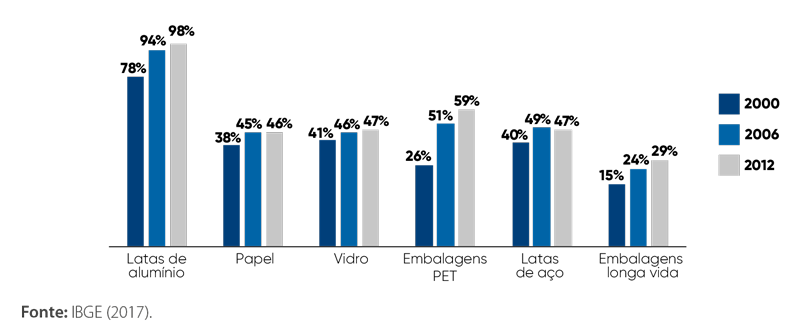
Goals
Managing solid waste as a valuable resource in line with the concepts of circular economy
 OBJECTIVE
OBJECTIVE
Increasing the percentage of recycled plastic in relation to total plastics production from 9.8% to 12.5%
![]() INICIATIVES
INICIATIVES
- Regulating the economic instruments contemplated in the National Solid Waste Policy
- Regulating energy recovery from urban solid waste
Improving the management of water resources, ensuring stability in their supply and prices
 OBJECTIVE
OBJECTIVE
Reducing the unused balance of revenues from water bills from R$241.5 million to R$145 million
![]() INICIATIVES
INICIATIVES
- Regulating mechanisms for charging for water use, including a mechanism to implement the refund of water charge
- Regulating and structuring a water reuse market
- Increasing water management efficiency to ensure greater water security for user sectors
Expanding the economic and sustainable use of biodiversity and forest resources
 OBJECTIVE
OBJECTIVE
Increasing the share of biodiversity-based goods in the total production of Brazilian industry from 0.48% to 0.60%
![]() INICIATIVES
INICIATIVES
- Stimulating greater economic and sustainable use of biodiversity and forest resources
- Improving infralegal standards to increase economic use of genetic resources
- Identifying opportunities for and risks of international agreements on biodiversity use and conservation
LOW-CARBON ECONOMY
Improving the efficiency of greenhouse gas emissions is an important step toward the inclusion of Brazilian industry in the low-carbon economy
Concerns about the effects of climate change have gained space on the agenda of multilateral organizations, government, companies and society at large.
In 2016, when it ratified its Nationally Determined Contribution (NDC), Brazil took on a voluntary commitment to reduce its GHG emissions by 37% by 2025 in relation to the base year 2005 (MMA, 2017).
Although deforestation still accounts for most national emissions, the proactive participation of industry in this agenda will provide benefits in terms of its competitive inclusion in the low-carbon economy and of access to world markets.
Identifying risks and opportunities related to the low-carbon economy should be an element of the corporate strategy. The need to control greenhouse gas emissions is a key item on this agenda. Carbon management has become a determining factor for the competitiveness of companies.
In this strategy, the role to be played by innovation in both technology and business models is critical.
ESTIMATE OF INDUSTRIAL EMISSIONS IN RELATION TO INDUSTRIAL GDP
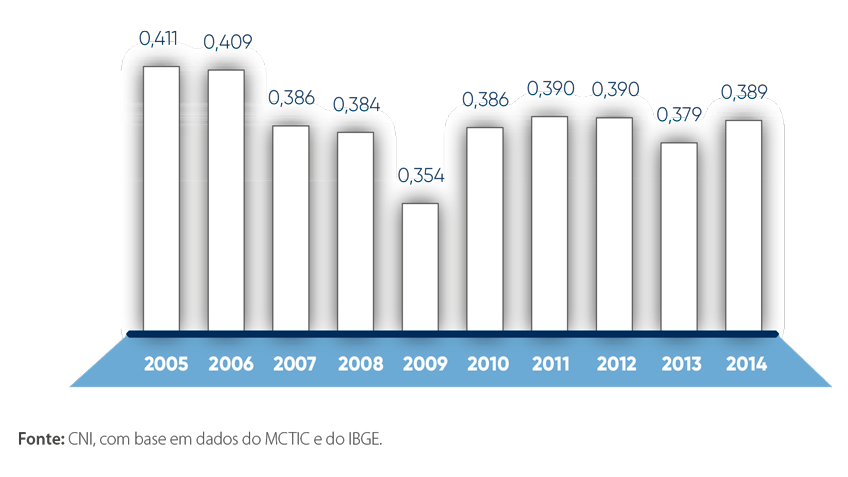
Goal
Reducing the intensity of CO2 equivalent emissions from Brazilian industrial production processes
 OBJECTIVE
OBJECTIVE
Reducing the ratio between CO2 equivalent emissions by industry and industrial GDP from 0.39 to 0.38.
![]() INICIATIVES
INICIATIVES
- Identifying opportunities and risks of implementing the Nationally Determined Contribution (NDC)
- Assessing the impacts of carbon pricing on industry competitiveness
- Promoting innovation to increase efficiency in greenhouse gas emissions
- Promoting actions aligned with the principles of circular economy and efficiency in the use of resources
- Promoting and stimulating energy efficiency in industry
ENVIRONMENTAL LICENSING
The lack of clear and uniform standards in environmental licensing procedures is detrimental to the environment and to Brazil’s socioeconomic development
The standards that govern environmental licensing in Brazil are not objective and clear as they should, leading to a high degree of discretion on the part of licensing agencies and generating legal uncertainty.
Licensing processes are long and bureaucratic and imply high costs for businesses. This ends up spoiling the business environment and driving investments away.
A federal standard setting general guidelines for environmental licensing throughout the national territory is necessary with the aim of reducing red tape and making the process more objective, so as to reduce the distortions that prevail in the various procedures adopted in the country.
In addition, licensing applications are analyzed without taking into account the potential impacts and benefits of investments. The analyses should consider Brazil’s future needs in terms of infrastructure and of the environmental and socioeconomic issues involved.
AVERAGE TIME IN DAYS FOR OBTAINING ENVIRONMENTAL LICENSES FROM BRAZILIAN INSTITUTE FOR THE ENVIRONMENT AND RENEWABLE NATURAL RESOURCES (IBAMA)
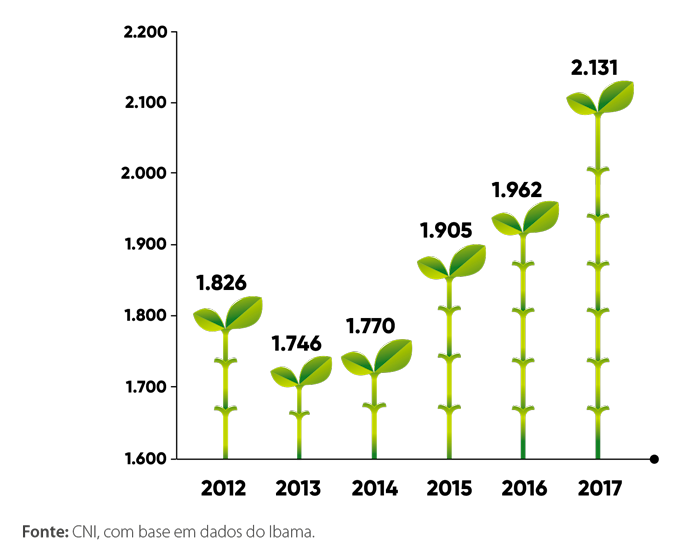
Goal
Improving the environmental licensing system
 OBJECTIVE
OBJECTIVE
Reducing the average time for obtaining environmental licenses from the Brazilian Institute for the Environment and Renewable Natural Resources (IBAMA) from 2,131 to 1,750 days
![]() INICIATIVES
INICIATIVES
- Approving a national standard for environmental licensing
- Regulating a legal framework for environmental licensing
- Encouraging the use of planning instruments to guide and expedite environmental licensing procedures
BASIC SANITATION
The need to overcome deficiencies in basic sanitation services in Brazil affords opportunities for industry
Brazil is yet to solve sanitation problems that affect the quality of life of its population and compromise water quality in its rivers, lakes and dams.
The terrible quality of the water resulting from discharges of untreated sewage into water bodies increases the costs of industrial production. Low-quality water and a poor sanitation infrastructure reduce labor productivity by adversely affecting workers’ health and quality of life.
Improvements in the sanitation conditions of the Brazilian population will increase productivity, generate business in associated value chains and, consequently, increase the country’s competitiveness.
Open dumps are still a reality in Brazil. The objective of putting an end to open- pit dumps set forth in the National Solid Waste Policy is far from being achieved. Building sanitary landfills has proven to be economically unfeasible in small municipalities and other solutions must be devised and implemented.
Despite a small expansion in recent years, the supply of drinking water has not been universalized and the sewage network is still very small. The participation of the private sector in these services is strategic to ensure universal access to them and to solve the problem of garbage disposal, especially at this moment, when the public sector does not have sufficient resources for investment.
COVERAGE AND TREATMENT INDICES - BRAZIL
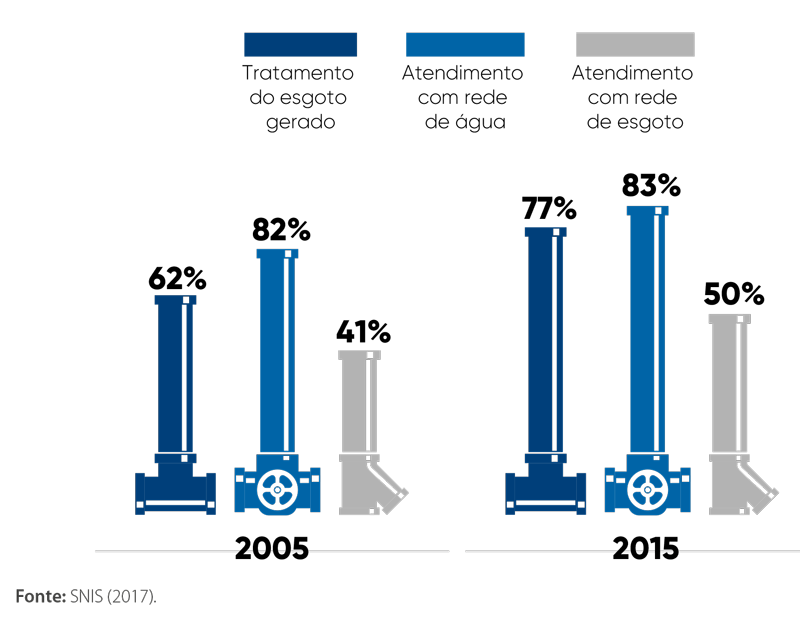
Goals
Improving efficiency in the provision of urban solid waste management services
 OBJECTIVE
OBJECTIVE
Increasing the coverage rate of environmentally adequate collection and disposal of urban solid waste from 58.7% to 70.0%
![]() INICIATIVES
INICIATIVES
- Improving the National Policy on Solid Waste and the National Policy on Basic Sanitation
Improving the efficiency of services and ensuring universal access to water supply and sewage systems
 OBJECTIVE
OBJECTIVE
Increasing the provision of sewage collection services from 50.3% to 60.0% of the population
![]() INICIATIVES
INICIATIVES
- Improving the regulation of basic sanitation
- Regulating the Special Regime of Incentives for the Development of Basic Sanitation
- Simplifying procedures for the release of public funds
KEY FACTORS
Click on each key factor below to learn more about the Map
